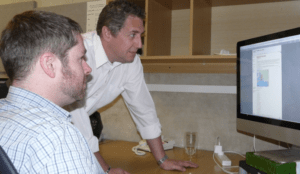Harvesting descriptive information (metadata) about environmental data is usually time-consuming and difficult work — but it has just become easier and quicker thanks to Eco-informatics.
Craig Walker, the director of Eco-informatics, which is based in Adelaide, said the facility had created metadata for about 700 research data archive datasets held by the South Australian Department of Environment and Natural Resources (DENR) and provided them to the Australian National Data Service (ANDS) for publishing on the Research Data Australia web portal.
The facility could now provide similar services to other government agencies.
‘Eco-informatics is able to easily extract metadata in the format required by ANDS from the Australian Ecological Knowledge and Observation System (ÆKOS) data repository,’ Craig said.
‘This is achievable because ÆKOS uses a flexible ontological model. It is designed to represent both ecological data content and data sets covering the spectrum from what was observed through to details of how the information was collected and recorded, and finally how that information is organised, managed and published.
‘The model incorporates the detail needed to produce the metadata format used by ANDS, which is known as RIF-CS, as this important requirement was specifically included in the design process.
‘Supplying metadata in such a complex metadata format was previously labour intensive, required specialist expertise, and was a costly exercise in terms of ‘data exchange’ software development.
‘Eco-informatics has reduced these overheads for DENR and could provide the same benefits for other state and territory agencies via collaborative partnerships,’ Craig said.
The facility is bringing together complex ecological data (systematically collected) from state agency databases for display and analysis at a national level by building long-term collaborative partnerships. Once copies of their ecological data are semantically integrated and regularly updated via ÆKOS, the supply of agency metadata to ANDS will be easy and fast.
Martin Pullan, the project manager of the software team, explained the process in technical terms. He said that Eco-informatics had developed computer code that allows any input data format to be mapped easily to the ANDS metadata (RIF-CS) format.
‘This is important, because ANDS acts as the highest-level metadata library in Australia, allowing people to search for a range of data collections at a national level,’ Martin said.
’We can now bridge between the structure of any source database, including ÆKOS, and output in ANDS standard data exchange format without needing to rewrite the translation program each time.’
‘So this approach simplifies harvesting, reduces the development effort required, and enables us to scale up the metadata output regardless of how big or how many different data sets are provided to us.’
One agency is already using this service and Eco-informatics welcomes additional mutually beneficial partnerships of this nature with state agencies and other custodians of terrestrial ecological data.
Craig Patten and Martin Pullan view the South Australian DENR biological survey metadata provided to the Research Data Australia portal








